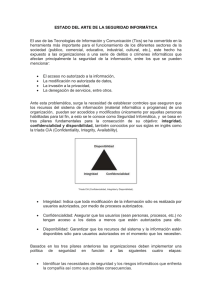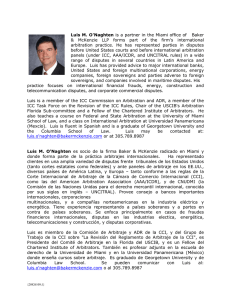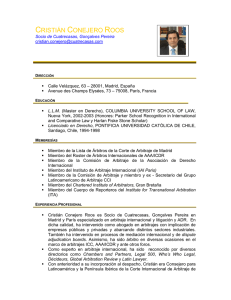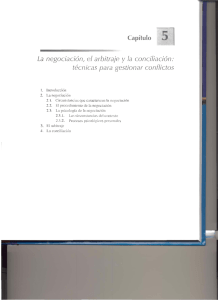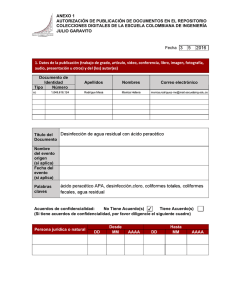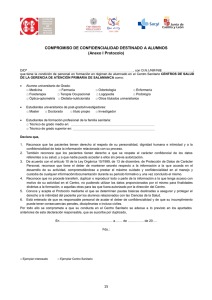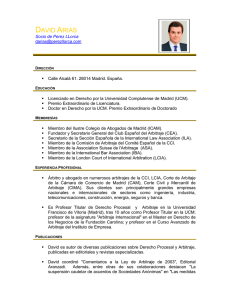la confidencialidad: agente motivador para pactar la
Anuncio
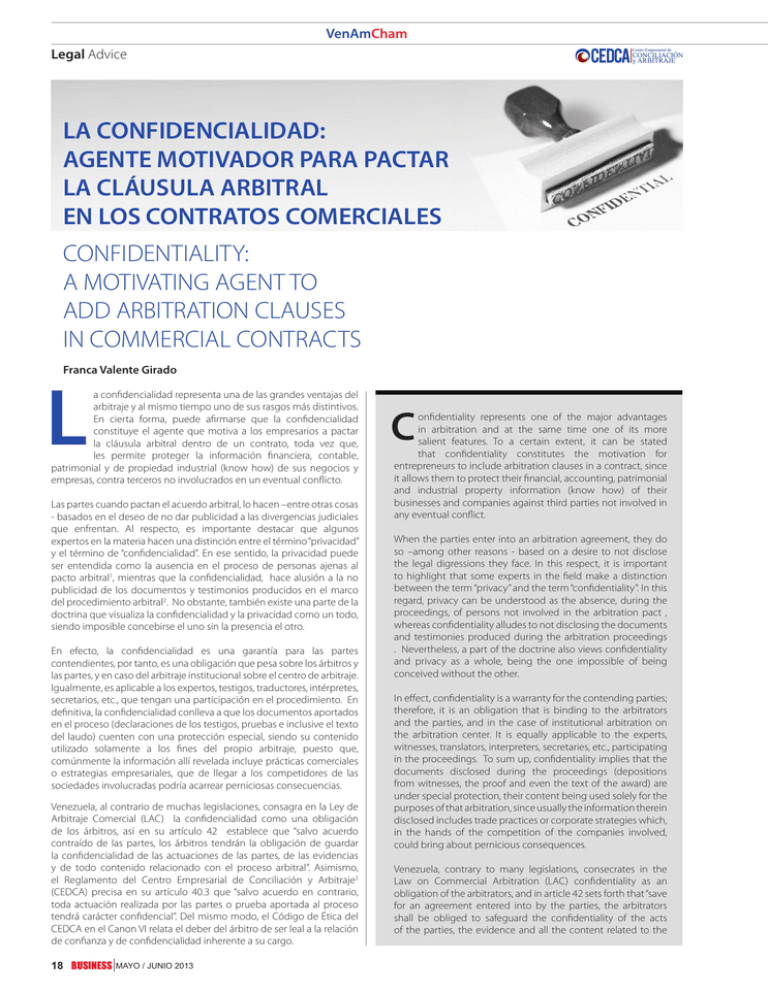
VenAmCham Legal Advice LA CONFIDENCIALIDAD: AGENTE MOTIVADOR PARA PACTAR LA CLÁUSULA ARBITRAL EN LOS CONTRATOS COMERCIALES CONFIDENTIALITY: A MOTIVATING AGENT TO ADD ARBITRATION CLAUSES IN COMMERCIAL CONTRACTS Franca Valente Girado L a confidencialidad representa una de las grandes ventajas del arbitraje y al mismo tiempo uno de sus rasgos más distintivos. En cierta forma, puede afirmarse que la confidencialidad constituye el agente que motiva a los empresarios a pactar la cláusula arbitral dentro de un contrato, toda vez que, les permite proteger la información financiera, contable, patrimonial y de propiedad industrial (know how) de sus negocios y empresas, contra terceros no involucrados en un eventual conflicto. Las partes cuando pactan el acuerdo arbitral, lo hacen –entre otras cosas - basados en el deseo de no dar publicidad a las divergencias judiciales que enfrentan. Al respecto, es importante destacar que algunos expertos en la materia hacen una distinción entre el término “privacidad” y el término de “confidencialidad”. En ese sentido, la privacidad puede ser entendida como la ausencia en el proceso de personas ajenas al pacto arbitral1, mientras que la confidencialidad, hace alusión a la no publicidad de los documentos y testimonios producidos en el marco del procedimiento arbitral2. No obstante, también existe una parte de la doctrina que visualiza la confidencialidad y la privacidad como un todo, siendo imposible concebirse el uno sin la presencia el otro. En efecto, la confidencialidad es una garantía para las partes contendientes, por tanto, es una obligación que pesa sobre los árbitros y las partes, y en caso del arbitraje institucional sobre el centro de arbitraje. Igualmente, es aplicable a los expertos, testigos, traductores, intérpretes, secretarios, etc., que tengan una participación en el procedimiento. En definitiva, la confidencialidad conlleva a que los documentos aportados en el proceso (declaraciones de los testigos, pruebas e inclusive el texto del laudo) cuenten con una protección especial, siendo su contenido utilizado solamente a los fines del propio arbitraje, puesto que, comúnmente la información allí revelada incluye prácticas comerciales o estrategias empresariales, que de llegar a los competidores de las sociedades involucradas podría acarrear perniciosas consecuencias. Venezuela, al contrario de muchas legislaciones, consagra en la Ley de Arbitraje Comercial (LAC) la confidencialidad como una obligación de los árbitros, así en su artículo 42 establece que “salvo acuerdo contraído de las partes, los árbitros tendrán la obligación de guardar la confidencialidad de las actuaciones de las partes, de las evidencias y de todo contenido relacionado con el proceso arbitral”. Asimismo, el Reglamento del Centro Empresarial de Conciliación y Arbitraje3 (CEDCA) precisa en su artículo 40.3 que “salvo acuerdo en contrario, toda actuación realizada por las partes o prueba aportada al proceso tendrá carácter confidencial”. Del mismo modo, el Código de Ética del CEDCA en el Canon VI relata el deber del árbitro de ser leal a la relación de confianza y de confidencialidad inherente a su cargo. 18 MAYO / JUNIO 2013 C onfidentiality represents one of the major advantages in arbitration and at the same time one of its more salient features. To a certain extent, it can be stated that confidentiality constitutes the motivation for entrepreneurs to include arbitration clauses in a contract, since it allows them to protect their financial, accounting, patrimonial and industrial property information (know how) of their businesses and companies against third parties not involved in any eventual conflict. When the parties enter into an arbitration agreement, they do so –among other reasons - based on a desire to not disclose the legal digressions they face. In this respect, it is important to highlight that some experts in the field make a distinction between the term “privacy” and the term “confidentiality”. In this regard, privacy can be understood as the absence, during the proceedings, of persons not involved in the arbitration pact , whereas confidentiality alludes to not disclosing the documents and testimonies produced during the arbitration proceedings . Nevertheless, a part of the doctrine also views confidentiality and privacy as a whole, being the one impossible of being conceived without the other. In effect, confidentiality is a warranty for the contending parties; therefore, it is an obligation that is binding to the arbitrators and the parties, and in the case of institutional arbitration on the arbitration center. It is equally applicable to the experts, witnesses, translators, interpreters, secretaries, etc., participating in the proceedings. To sum up, confidentiality implies that the documents disclosed during the proceedings (depositions from witnesses, the proof and even the text of the award) are under special protection, their content being used solely for the purposes of that arbitration, since usually the information therein disclosed includes trade practices or corporate strategies which, in the hands of the competition of the companies involved, could bring about pernicious consequences. Venezuela, contrary to many legislations, consecrates in the Law on Commercial Arbitration (LAC) confidentiality as an obligation of the arbitrators, and in article 42 sets forth that “save for an agreement entered into by the parties, the arbitrators shall be obliged to safeguard the confidentiality of the acts of the parties, the evidence and all the content related to the VenAmCham Legal Advice Es necesario mencionar que las leyes de muchos países no se refieren al tema de la confidencialidad y de tocarlo lo hacen someramente. Esto ha ocasionado que la doctrina debata en torno a si la confidencialidad es inherente al arbitraje o por el contrario las partes deben pactar expresamente un acuerdo de confidencialidad. Los especialistas de la práctica arbitral que defienden la presunción de confidencialidad en el arbitraje, aún cuando las partes no lo hayan acordado o la ley silencie este aspecto, lo hacen basándose en la naturaleza privada del arbitraje. En consecuencia, el deber de confidencialidad se mantendrá no sólo en el transcurso del proceso sino también concluido éste, generando la responsabilidad en cabeza del árbitro que lo violente. Frente a estos planteamientos, encontramos otros que insisten en que la confidencialidad debe quedar claramente establecida en un acuerdo de confidencialidad independiente o en la misma acta que fije las normas a seguir en el proceso. Esta posición tiene sustento, ya que al no quedar expresamente pactado el deber de confidencialidad, una de las partes podría maliciosamente, como táctica dilatoria, revelar cierta información otorgada en el arbitraje y así perjudicar el desarrollo del procedimiento. LÍMITES A LA CONFIDENCIALIDAD arbitration proceedings”. Likewise, article 40.3 of the regulations of the Corporate Conciliation and Arbitration Center (CEDCA) states that “save for an agreement to the contrary, all acts conducted by the parties or proof submitted during the proceedings shall be of a confidential nature”. Also, section VI of the code of ethics of the CEDCA states the arbitrator´s duty to be loyal to the relation of trust and confidentiality inherent to their position. We must mention that the laws in many countries do not refer to the topic of confidentiality and if they do, it is very fleetingly. This has brought about debates in the doctrine as to whether confidentiality is inherent to arbitration or on the contrary, the parties must expressly enter into a confidentiality agreement. The specialists in arbitration practices that defend the presumption of confidentiality in arbitration, even when the parties have not agreed to it or the law remains silent in this respect, they do so based on the private nature of arbitration. Consequently, the duty of confidentiality shall remain not only during the course of the proceedings but also when it concludes, thereby the responsibility falls on the head of the arbitrator who breaches it. Toda regla tiene su excepción, por ello en la práctica la confidencialidad en el arbitraje aloja ciertos límites. Por ejemplo, si una de las partes interpone un recurso de nulidad contra el laudo o inicia el proceso de ejecución forzosa de éste, se producirá la intervención judicial, lo que significa el conocimiento obligatorio del juez sobre el procedimiento, por ende, toda la actuación arbitral se hace pública. Incluso, la confidencialidad puede quebrantarse por razones de interés público o cuando a efectos de consolidar una especie de “jurisprudencia arbitral” se permita dar a conocer el contenido de algunos laudos que puedan influenciar en la doctrina. Faced with these quandaries, other specialists insist that confidentiality must be clearly established in an independent confidentiality agreement or in the document setting forth the norms to be followed during the proceedings. This posture makes sense since if the duty of confidentiality is not expressly mentioned, one of the parties could maliciously as a dilatory tactic disclose certain information submitted in arbitration and this jeopardize the unfolding of the procedure. RESPONSABILIDAD POR EL INCUMPLIMIENTO DEL DEBER DE CONFIDENCIALIDAD Every rule has its exception, that´s why in practice, confidentiality in arbitration has certain limits. For instance, if one of the parties files a petition for annulment against the award or starts a compulsory execution proceeding thereof, judiciary intervention shall ensue, and the judge will forcefully have to deliberate on this proceedings, and the entire proceedings become of public disclosure. Confidentiality could even be broken for reasons of public interest or when, for the purposes of consolidating a manner of “arbitration jurisprudence” the content of certain awards that might influence the doctrine is permitted to be disclosed. La confidencialidad por ser un deber, genera responsabilidad por incumplimiento. En ese sentido, el árbitro debe considerar todos los aspectos del arbitraje como confidenciales, es decir, no puede entregar actas de las audiencias a terceros que no sean parte y tampoco puede obtener ventaja personal de la información a la cual tuvo acceso4, en caso contrario los árbitros serán responsables por los daños y perjuicios ocasionados a las partes. Igualmente, algunos centros de arbitraje como el CEDCA5, el de la Cámara de Comercio de Brasil6 y el de Amcham Perú7, consagran la confidencialidad como deber tanto en sus Reglamentos como en sus respectivos Códigos de Ética, lo que ocasionaría una especie de responsabilidad disciplinaría del árbitro con el centro. En síntesis, cabe afirmarse que la confidencialidad es uno de los rasgos más ventajosos y útiles del arbitraje, que motiva a las partes a considerarlo como mecanismo de solución de sus controversias, para evitar no sólo la demora procesal en la jurisdicción ordinaria, sino porque además permite asegurarle a las empresas que su nombre, reputación y secreto comercial no sean afectados. Si bien se discute el contenido y la presunción o no de la confidencialidad, en definitiva ésta debe respetarse, puesto que forma parte de la naturaleza misma del arbitraje, que a pesar de tener sus límites, el violentarla, sería desvirtuar y atentar contra una figura, que hoy se presenta a los empresarios como una verdadera garantía del Estado de Derecho. Smith - M. Moh “Confidentiality of Arbitrations-Singapores´s Position Following The Recent Case of Myanma Yaung Chi v. Win Win Wu” 2004, citado por M. Stojcevski - B. Zeller, “Confidentiality and Privacy Revisited” The International Journal of Arbitration, Mediation and Dispute Management Volumen 78, nro. 4, noviembre 2012. Chartered Institute Of Arbitrators, pp. 333 2 Ob. Cit. Nro. 1., pp. 338. 3 Reglamento de Conciliación y Arbitraje del Centro Empresarial de Conciliación y Arbitraje (CEDCA) del 2013. 4 J. Carlos Fernández Rozas. “Trayectoria y contornos del mito de la confidencialidad en el arbitraje comercial” Revista de Arbitraje Comercial y de Inversiones, vol. II Nro. 2, año 2009. pp. 356. 5 Ob. Cit. Nro. 3. 6 Código de Ética del Centro de Arbitraje y Mediación de la Cámara de Comercio de Brasil, enunciado 3. 7 Reglas de Arbitraje del Centro de Arbitraje de Amcham Perú, artículo 41. 1 LIMITS TO THE CONFIDENTIALITY LIABILITY DUE TO NON-COMPLIANCE OF THE DUTY OF CONFIDENTIALITY. Since confidentiality is a duty, it generates a liability for noncompliance. In this regard, the arbitrator must deem all arbitration aspects as confidential, meaning to say that the minutes of the hearings cannot be submitted to third parties who are not parties to the proceedings and neither can he take personal advantage of the information he had access to , or the arbitrator shall be liable for the damages and prejudices caused to the parties. Likewise, some arbitration centers such as the CEDCA , the one of the Chamber of Commerce of Brazil and Amcham Peru consecrate confidentiality as a duty in their regulations and their respective codes of ethic, thus creating a sort of disciplinary liability for the arbitrator with the center. In synthesis, it can be affirmed that confidentiality is one of the most advantageous and useful features in arbitration, motivating the parties to consider it as a mechanism to solve their controversies, to avoid not only procedural delays in regular legal channels, but also because it guarantees that the companies´ name, reputation and trade secrets shall not be affected. Although the content and presumption or not of confidentiality is up for debate, to sum up it must be respected since it is part of the nature of arbitration itself, and in spite of its limits breaching it would be tantamount to tainting and attempting against a figure which is presented today before entrepreneurs as a veritable guarantee of the rule of law. MAYO / JUNIO 2013 19


